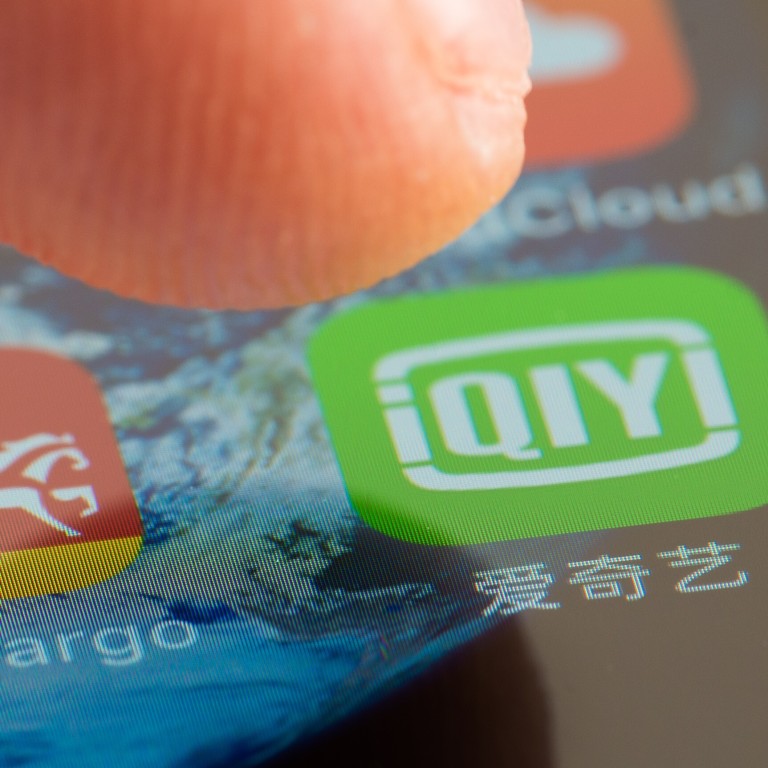
Taiwan plans to ban mainland Chinese streaming sites such as iQiyi and Tencent WeTV
- Taiwan is planning to ban mainland Chinese streaming giants iQiyi and Tencent Holdings from operating services on the island
- The order will prohibit Taiwanese individuals and organisations from working with mainland Chinese video streaming companies
The formal order, which will be announced on September 3, will prohibit Taiwanese individuals and organisations from working with mainland Chinese video streaming companies, the Ministry of Economic Affairs said in a notice on Tuesday. It added that this will prevent such companies from “operating illegally” in Taiwan through local agents and distributors.
iQiyi, a Netflix-like platform backed by Chinese search giant Baidu, applied in 2016 to set up a Taiwan subsidiary. Authorities rejected the application as online streaming is not on the list of permitted services open to mainland Chinese operators, the notice said.
The services violate the Act Governing Relations Between the People of the Taiwan Area and the Mainland Area, which stipulates Chinese companies can only invest in certain categories of goods and services, according to the notice.
However, platforms like iQiyi and Tencent’s WeTV have circumvented the restrictions by forming alliances with local broadcasters and distributors to promote and sell their video streaming services on the island. iQiyi – which may have as many as 6 million subscribers across Taiwan, according to a Taipei Times report in July – has a partnership with Taiwanese company OTT Entertainment to promote and sell its services on the island.
‘China’s Netflix’ tanks on Nasdaq as US watchdog probes alleged fraud
Chinese tech companies have been facing a global backlash over concerns related to national security and data privacy, with the US and India banning a variety of Chinese apps in recent weeks, including TikTok. Tensions between the Taiwanese government and mainland China have also worsened after the US ally recently signed an agreement to buy 66 of the latest model F-16 jets built by Lockheed Martin Corp.
The planned ban is Taiwan’s latest move to crack down on mainland Chinese streaming platforms, which have been on the radar screen of regulators for some time.
Cabinet spokeswoman Kolas Yotaka said in April that allowing Chinese online streaming services to function on the edge of the law by forming alliances with local companies amounted to a “breach of democracy”, and that the self-governing island was drafting a bill to address the loopholes, according to Taiwan’s Central News Agency.

03:08
India bans dozens of Chinese apps, including TikTok and WeChat, after deadly border clash
Tencent did not immediately respond to a request for comment. An iQiyi representative referred the Post to a statement by OTT Entertainment, which declined to comment on what the final legislation will entail, but said it was “fully committed to protecting the rights and interests of its users”.
“Regarding what the Draft Bill proposes, we wish to see the Taiwanese government departments involved recognise the benefits of an open market economy,” the OTT statement said.
“We want to point out that as streaming services are not classified as special industries, they should not become the specific target of legislation.”
Sale of TikTok in US is easier said than done for Zhang Yiming's ByteDance
“The international scrutiny of Chinese apps on national security and data privacy concerns will certainly become a rising impediment to the overseas expansion of China's internet companies,” said Bloomberg Intelligence analyst Vey-Sern Ling. “App bans as a form of geopolitical retaliation are easy to implement and have low collateral damage compared with measures like trade tariffs for example.”
“It seems like countries around the world are taking a tougher stance against Chinese apps,” said Serkan Toto, CEO of game industry consultancy Kantan Games.
“It can be argued that games and live-streaming are entertainment and therefore not in the cross-hairs, but I think in the end, that is a political question,” Toto said. “If a certain country wants to really push back against China-made services, it can of course also ban games or entertainment apps if needed.”
iQiyi’s Taiwan site exceeded 1.7 billion views last year, with its hit show The Legend of Haolan surpassing one million views within 28 hours, local media outlets cited the platform as saying in December. Tencent’s WeTV app also hit over one million downloads across Taiwan’s iOS and Android stores by the first day of 2020, less than a year after it debuted in 2019, Taiwanese news site InfoTimes reported.



